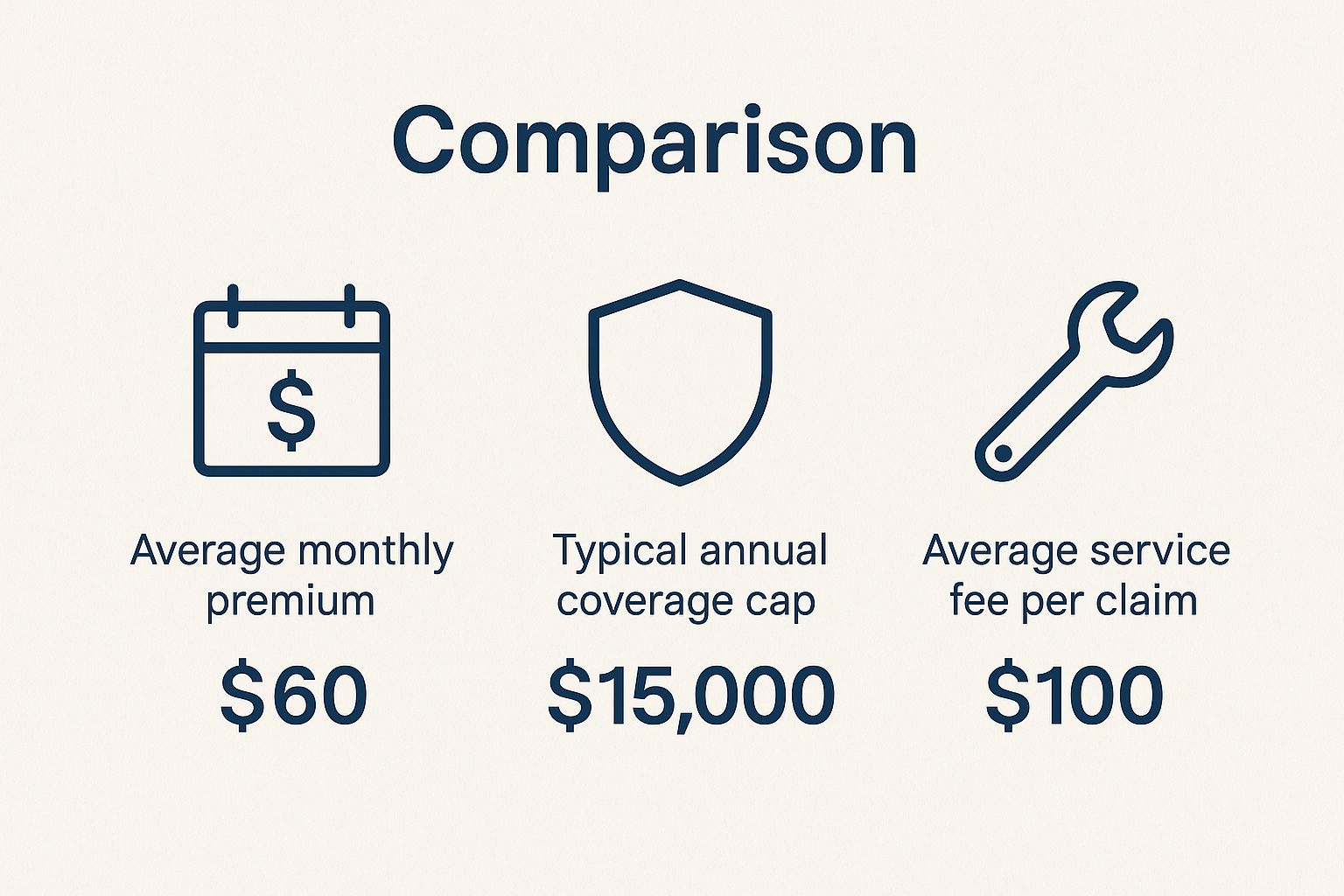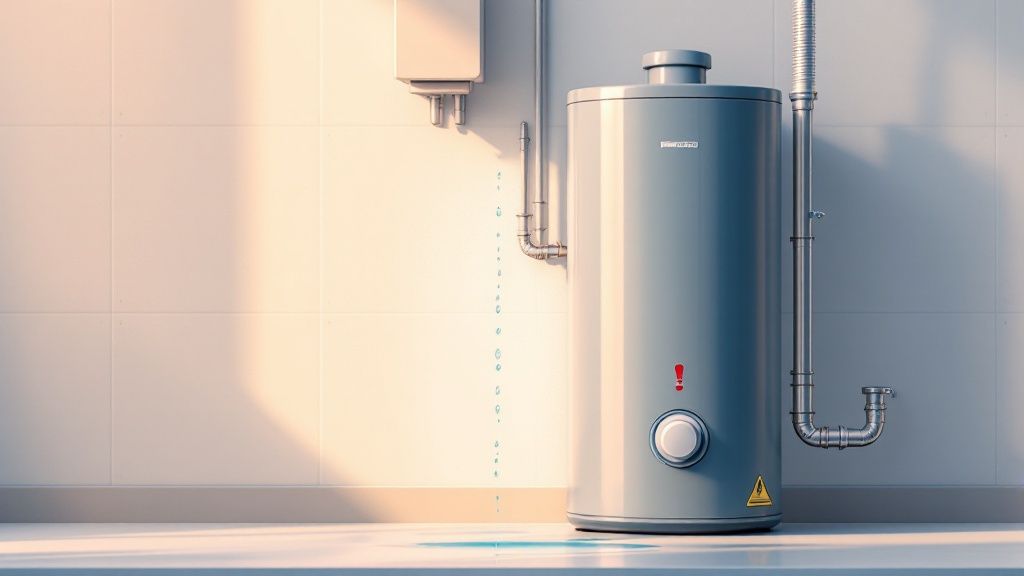A home seller warranty functions as a service agreement which covers repairs for essential home systems and appliances while the property remains on the market and during the first twelve months of homeownership. The program functions as a financial safety system which shields sellers from unplanned repair expenses during market time and provides buyers with protection after they have moved into the property. A property with this kind of enhancement will show better to potential buyers which results in a quicker and more successful sale process.
Selling a house requires you to perform a balancing act which feels like tightrope walking. The path seems to reach its end but then a sudden problem with the water heater disrupts everything. A home seller warranty operates as a crucial resource at this stage.
What Is a Home Seller Warranty?

Your home listing will face a critical situation when the air conditioning system fails during summer heat wave two weeks after you put it up for sale. Without a warranty, you’re on the hook for a sudden, expensive repair that could easily scare off a buyer or complicate negotiations.
The home seller warranty changes everything about this situation. The process requires you to call for service while paying a small fee which brings in a qualified technician to perform the replacement or repair work. The tool functions by removing all uncertainty from the sales process which results in less stress for everyone involved.
Two Phases of Protection
The real genius of a seller warranty is its two-part coverage. The protection starts immediately to defend your property from damage throughout the time it remains on the market. Your equipment needs to be operational during showings and inspections because this policy protects you from unexpected equipment failures that could disrupt your scheduled activities.
The policy becomes active for the new owner after you complete the purchase agreement and it will remain in effect for twelve months. This is a huge selling point. The guarantee provides buyers with assurance because they understand they will not encounter unexpected high-cost repairs after they become homeowners. A recent study showed home warranty stands as the top incentive which sellers should present to buyers during 2024.
This dual protection really works to your advantage:
- Keeps Your Budget Intact: The product safeguards your financial resources against unplanned repair costs which would normally reduce your earnings.
- Boosts Buyer Confidence: The condition of your home shows buyers that you have maintained it well which helps your property stand out from other listings.
- Smooths Out Closing: The process stops buyers from negotiating last-minute repairs which might stop sales from happening.
A home seller warranty provides complete protection for all home systems and appliances including HVAC systems and dishwashers so it functions as an investment that speeds up the selling process.
To give you a clearer picture, here’s a quick breakdown of what these warranties typically involve.
Home Seller Warranty at a Glance
The table contains all essential information which serves both sellers and buyers.
| Aspect | Typical Details for a Seller Warranty |
|---|---|
| Coverage Period | The protection begins when the home goes on the market and continues for twelve months after the sale completes. |
| Covered Items | The coverage protects major home systems including HVAC and plumbing and electrical systems and major appliances such as refrigerators and ovens and dishwashers. |
| Cost | The insurance policy requires a single payment which usually costs between $450 and $650 and must be paid during the closing process. |
| Service Fee | A small deductible, usually $75 – $125, paid by the user for each service call. |
| Transferability | The policy automatically transfers from the seller to the buyer upon closing. |
| Main Benefit | The insurance policy provides financial protection and peace of mind which makes the property more attractive to potential buyers. |
A warranty in place will boost your position during a traditional sale process. A warranty serves as a single tool among many tools which you can use. Homeowners who need to sell without the hassle of repairs, showings or market uncertainties should explore alternative methods. Our guide on how to sell your house quickly explains different options which you can try.
The Strategic Edge a Seller Warranty Gives You

A seller’s home warranty functions as a repair plan and a powerful marketing tool which you can use to sell your home. A warranty offer creates an instant competitive advantage for your listing when you compete in a crowded market. The method produces immediate results which have the ability to transform your sales outcomes.
The single feature sends out a clear message to buyers that you present yourself as a confident transparent seller. The home shows signs of proper maintenance because you stand behind its essential systems. We need to establish trust starting from the first time someone sees your online listing not just when they need a faucet repair.
The Psychology of Buyer Confidence
Buying a house creates anxiety for everyone who goes through the process. The primary concern for most buyers stems from the unknown because they fear their investment will fail right after they use all their funds for the purchase.
A home seller warranty tackles that fear head-on. The policy functions as a major psychological safety system. The policy protects buyers from furnace breakdowns because it changes their concern into assurance that they have coverage. The additional security will help the buyer make their decision to submit a winning offer.
The first financial risk of post-sale problems disappears when you take it away from buyers so they can focus on your home’s top features instead of worrying about possible problems. The negotiation process usually becomes more friendly and smooth when both parties show confidence.
Making Your Listing More Attractive
A home with a warranty stands as the clear choice when all other factors remain unchanged. The purchase offers an instant benefit which buyers appreciate because they have to make a choice between multiple options.
Here’s how it gives you an edge:
- A Clear Differentiator: The warranty serves as the deciding factor for buyers who become confused between your home and a nearby property that resembles it.
- Appeal to Real Estate Agents: Agents love listings with warranties. The agents understand that the warranty system reduces their work by minimizing customer problems and post-sale communication and results in satisfied clients.
- Reduced Buyer Hesitation: The warranty eliminates a major obstacle which makes it easy for buyers to decide “yes” and proceed with their purchase.
The protection layer acts as your defense system against upcoming problems. The new home owner must contact the warranty company for dishwasher service after one month of ownership instead of you. The process creates a clean separation which stops problems from emerging after the sale has completed.
Real-World Scenarios and Faster Sales
Two houses with identical features stand for sale in the same neighborhood. Your house has a seller’s warranty. The other doesn’t. A home inspector points out that both HVAC systems are 15 years old—they work fine, but they’re getting up there in age.
The buyer will need to receive either a price discount or a credit which equals the cost of replacing the home. But the buyer for your home knows they have a full year of coverage. The HVAC’s age becomes a minor detail, not a deal-breaker. The result? You get to the closing table faster and with a lot less friction.
A warranty functions as one element among many which contribute to the total package. To really make your home pop and sell in record time, you’ll want to explore broader strategies for selling your house quickly. The methods function together with the protection which a warranty offers. However, for sellers who need an even quicker, more certain sale—without worrying about repairs, warranties, or showings at all—other options exist that might be a better fit.
What Your Warranty Actually Covers and Excludes
The home seller warranty functions as a specialized insurance plan which protects against major home problems instead of minor cosmetic damages. The system operates to defend the intricate networks and fundamental equipment which transform a house into a practical dwelling. To achieve optimal results and set precise buyer expectations you must study the fine print thoroughly.
The real power of a warranty is its focus on a home’s core components. Most standard insurance policies protect the equipment which operates the facility despite each policy having its own unique characteristics. The global home warranty market experiences rapid growth because people seek protection against expensive repair costs. The market reached $1.9 billion in 2020 and analysts predict it will grow to $7.8 billion by 2033.
Major Systems Typically Covered
Most plans are built around the three systems that are often the most expensive to fix. The failure of any one of these systems would create buyer hesitation and long-lasting problems after the sale closes.
- HVAC System: This is a big one. The policy provides coverage for your furnace and air conditioning system together with the ductwork that runs throughout your home. The warranty provides coverage for AC repairs which brings peace of mind to buyers who want to purchase an older unit.
- Plumbing System: The system includes interior plumbing lines and water heaters and clog removal services. A good policy protects against both minor leaks and major system breakdowns including sewer line replacement which prevents unexpected high costs for all parties.
- Electrical System: This covers the backbone of your home’s power, like the wiring, breaker panels, and outlets. The warranty service will send a technician for repair when a circuit breaker keeps tripping or an electrical outlet stops working.
Essential Appliances Under Warranty
A solid warranty must cover both the home structure and all major appliances because buyers need these items to function properly on their first day of ownership.
Here’s a quick list of what’s usually included:
- Refrigerator
- Oven, range, and cooktop
- Dishwasher
- Built-in microwave
- Garbage disposal

The small premium and fixed service fee protect you and your buyer from expensive repair costs that tend to exceed $15,000.
What Is Almost Always Excluded
The knowledge of covered items requires equal understanding of excluded items. A home seller warranty isn’t a get-out-of-jail-free card for a poorly maintained property. Knowing the typical warranty exclusions allows you to prevent claim rejections while maintaining transparency with buyers about warranty coverage.
To help clarify, here’s a quick breakdown of what you can generally expect a warranty to cover versus what it won’t.
Typical Coverage vs. Common Exclusions
| Category | Typically Covered | Often Excluded |
|---|---|---|
| Reason for Failure | Normal wear and tear | Pre-existing conditions, neglect, misuse |
| Home Components | Major systems (HVAC, plumbing, electrical) | Structural items (roof, foundation, windows) |
| Appliances | Functional failure of major appliances | Cosmetic damage (dents, scratches, rust) |
| Plumbing | Interior pipes, water heater, stoppages | Outdoor sprinkler systems, septic tanks |
| Electrical | Interior wiring, panels, switches | Doorbells, garage door openers, alarms |
A warranty exists to handle breakdowns which occur during normal usage rather than pre-existing issues or problems caused by neglect.
Here are the most common reasons a claim gets denied:
- Pre-existing Conditions: This is the big one. If a home inspector flagged a faulty furnace before you got the warranty, it’s a “known” pre-existing condition and won’t be covered. An “unknown” issue that pops up later might be covered, but it can be a gray area.
- Improper Maintenance: The warranty company will probably reject your claim when your AC unit stops working because you never replaced the filters. They expect basic, routine upkeep.
- Cosmetic Issues: A dent in the fridge door or a chip on the stovetop? Not covered. Warranties are about function, not fashion.
- Structural Components: Things like the roof, windows, walls, and foundation are outside the scope of a standard home warranty.
A home seller warranty functions as a protective system which offers strong defense. When you have complete knowledge about its capabilities and limitations you can use this tool effectively to help buyers feel comfortable and complete their purchase quickly.
Choosing the Right Warranty Without Overpaying
Learning about home seller warranties seems overwhelming yet you can find affordable coverage by searching for the right plan. The essential part lies in your ability to identify what you are facing while making appropriate inquiries and performing research about the businesses under consideration. A smart approach ensures you get a policy that provides real value, not just a flimsy piece of paper.
So, what does this actually cost? The process usually remains simple and straightforward. You will need to pay a single premium between $400 and $600 which insurance companies typically include in your closing settlement. Then, there’s a service call fee (think of it like a deductible) of about $75 to $125 each time a service technician is called out.
Of course, not all plans are priced the same. The total cost will depend on multiple factors including your home size and age as well as your chosen protection level. The cost of a basic plan for a small condominium will be lower than the cost of a premium plan for a large older home with additional features such as a pool and spa.
Vetting Warranty Providers Like a Pro
Let’s be honest: not all warranty companies are the same. The difference between a great experience and a total nightmare often boils down to the company’s reliability and how upfront they are. Before you sign any agreement you should ask important questions because it will protect you and your buyer from future problems.
Before you commit, run through this checklist:
- What’s your claims process really like? Check the provider’s claim procedure by contacting them to learn about their claim acceptance times and their response speed and tracking options. A company with a 24/7 online portal is a huge plus.
- How do you choose your service technicians? The repair technician who arrives at your location holds all the power. A good warranty company will confirm their contractors are licensed, insured, and have a solid reputation.
- What are the coverage caps? The amount of coverage available in insurance policies varies between different policies. The company has established limits for its payment amounts which apply to individual repairs and specific appliances and total yearly payments. A cheap premium doesn’t mean much if the coverage cap for an HVAC system is only $1,500.
- Can I see a full sample contract? You should never base your decisions on the marketing brochure alone. The actual contract contains all details about terms and conditions and most importantly reveals the exact exclusions.
Reading the Fine Print on Claim Denials
The most common complaint about home warranties comes from customers who experience claim rejections. You will better understand what to expect from denial reasons and find a company that offers fair service. Watch for any sections which discuss previous health problems or improper maintenance work or incorrect installation methods.
A reputable warranty company will have clear, unambiguous language defining these terms. The contract shows signs of being unclear so you should search for another provider who offers better clarity.
The home warranty industry generates substantial revenue because the U.S. market reached $3.9 billion during 2023. But despite its size, only about 5% of American households currently have a home warranty, which shows there’s a lot of room for growth as more people see the benefit. You can find more home warranty statistics and market trends to get a better sense of the industry. The process of careful decision making leads you to become a successful customer instead of ending up as a warning example.
Exploring Your Alternatives to a Home Warranty

A home seller warranty can be a great tool, but it’s certainly not the only way to make your property more attractive and build buyer confidence. Your specific situation—your timeline, your home’s condition, and your ultimate goals—might call for a different approach.
Multiple options need evaluation before making any choices. The process will help you discover the best approach which fits your needs whether you want to offer buyers maximum flexibility or need to complete the sale quickly and efficiently.
Let’s explore some of the most popular and successful alternatives.
Offer a Seller Credit at Closing
You can choose to give the buyer a seller credit which people commonly refer to as a concession instead of purchasing a warranty policy. The buyer agrees to cover a specified portion of the closing costs through this method of payment.
For instance, rather than spending $600 on a warranty, you could offer a $600 credit. The cash goes directly to the buyer because they require it at this moment. The warranty gives buyers the ability to choose between purchasing their own warranty or saving money for future repairs or home improvements. Buyers often love this kind of flexibility.
Proactively Address Repairs with a Pre-Listing Inspection
You need to get a pre-listing inspection before you start marketing your home. The checklist helps you identify problem areas so you can perform the necessary repairs according to your own timetable.
The repair work you perform at the beginning guarantees that buyers will receive an inspection report which shows no issues. The degree of openness helps build strong trust between people. The condition of your home shows evidence of proper maintenance which holds more value than any warranty could offer.
Think of it this way: a home warranty is a promise to fix what might break later. The pre-listing inspection with completed repairs demonstrates that you have resolved existing problems. The warranty provides greater comfort to numerous buyers.
Use an Escrow Holdback for Specific Issues
What if an inspection reveals one major item which costs a lot to fix such as a roof that will only last for the next few years? You can suggest an escrow holdback as a solution in these situations.
A portion of your sale proceeds will be held in an escrow account for a predetermined time period after the closing process is complete. The funds are earmarked to cover that one particular repair. The solution directly resolves a major customer issue without including the extensive coverage that comes with full warranties.
Consider Selling Your House As-Is
The main objective for certain sellers involves getting a quick and guaranteed transaction that remains straightforward. If you’d rather skip the inspections, negotiations, and warranty debates entirely, selling your home “as-is” to a cash buyer is another great alternative.
The program allows you to avoid concerns about your furnace age and dishwasher condition. The buyer will not need to pay for any warranties or credits because they will accept the property exactly as it is. Our complete guide will teach you all about the benefits of selling your home for cash. The home-selling process becomes quick and simple when you work with Eagle Cash Buyers.
Common Questions About Seller Home Warranties
The decision to purchase a seller home warranty brings up multiple practical questions which remain even after you have reviewed the benefits and drawbacks. The answers to these common questions will help you decide if a warranty makes sense for your sale.
Let’s start by discussing several common questions which sellers often ask me.
Do I Need an Inspection Before Getting a Warranty?
Technically, no. The majority of warranty providers do not require home inspections to start coverage. The decision to get one is absolutely smart.
Think of it as looking under the hood before you sell the car. An inspection allows you to find existing problems such as a failing water heater which warranties typically do not protect against. Learning about these issues now enables you to manage them according to your preferred schedule. The protection prevents future claim denials which might lead to disputes between you and your buyer.
What Happens if a Warranty Claim Is Denied?
The process creates frustration but it does not guarantee that your claim will be denied. The first thing you need to do is read the denial letter from the warranty company and understand exactly why they rejected it. The denial usually comes from a particular policy exclusion such as pre-existing conditions or insufficient maintenance.
If you think they got it wrong, you can absolutely appeal their decision. The success of this situation depends on your organizational skills. Your case needs documentation so you should collect all maintenance records and service proofs and possibly additional contractor evaluations. A well-documented appeal has a much better shot at getting overturned.
A home seller warranty functions as a protective system which provides security to sellers yet it does not replace the need for regular home maintenance. Proper maintenance records for your main systems serve dual purposes because they support warranty claims and demonstrate your homeownership responsibility to potential buyers.
How Does the Warranty Transfer to the Buyer?
This is the easiest part of the whole thing and a big reason why these warranties are so popular. The transfer takes place automatically when the closing table process begins.
The insurance coverage which protected your home during its time on the market will now protect the buyer for the next twelve months. There’s no extra paperwork for anyone. The automatic transfer of the warranty to the buyer is what gives this product its marketing advantage because it provides uninterrupted coverage for one year without any additional costs. Financial problems create obstacles during the sales process so you need to understand your available choices; our guide about selling a home with financial challenges provides useful information.
Is a Warranty Worth It for an Older Home?
The warranty provides greater value to an older residential property because of its increased importance. It’s just a fact of life that the systems and appliances in an older property have seen more action, which means they’re closer to a potential breakdown.
The seller maintains their protection from expensive repair costs during the period when the house remains available for purchase. For the buyer, it’s a massive confidence booster. The uncertainty about how much an older home will cost to repair makes people nervous but a one-year warranty can ease those worries. The letter of intent functions as the required document which will help buyers create their complete offer. Make sure to review all the details because certain insurance plans restrict their protection for older equipment.
At the end of the day, a home seller warranty is just one tool in your selling toolkit. A warranty serves as a beneficial addition which protects the property during its sale through traditional methods.
If your main priority is to sell your home quickly then you should consider other selling methods which avoid inspection and repair processes and warranty agreements. The ideal choice for homeowners who need to sell their property quickly is to work with a cash buyer. At Eagle Cash Buyers, we buy homes as-is, which means you can close in as little as 14 days with zero fees or commissions. If that straightforward approach sounds right for you, you can get your fair cash offer today.





